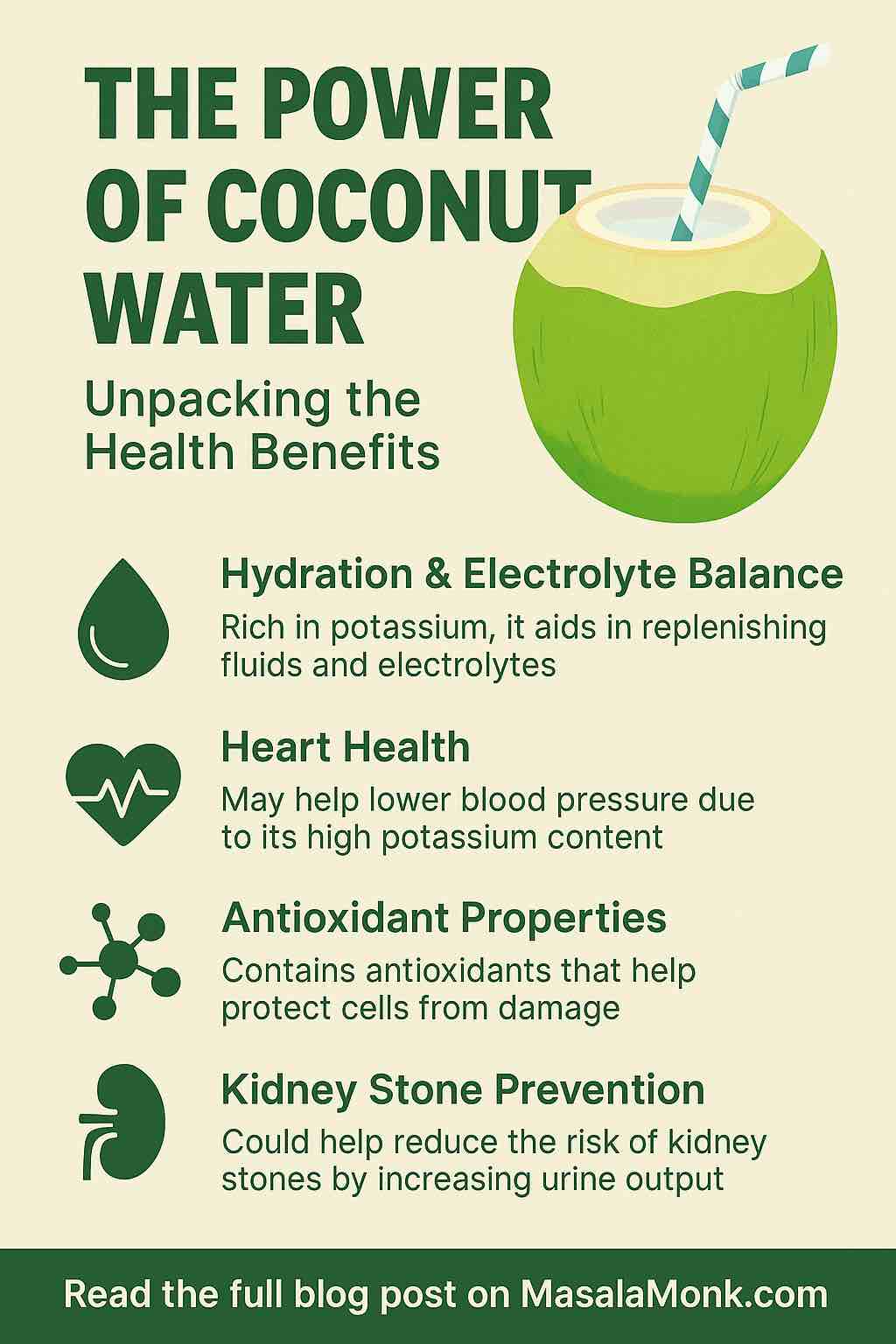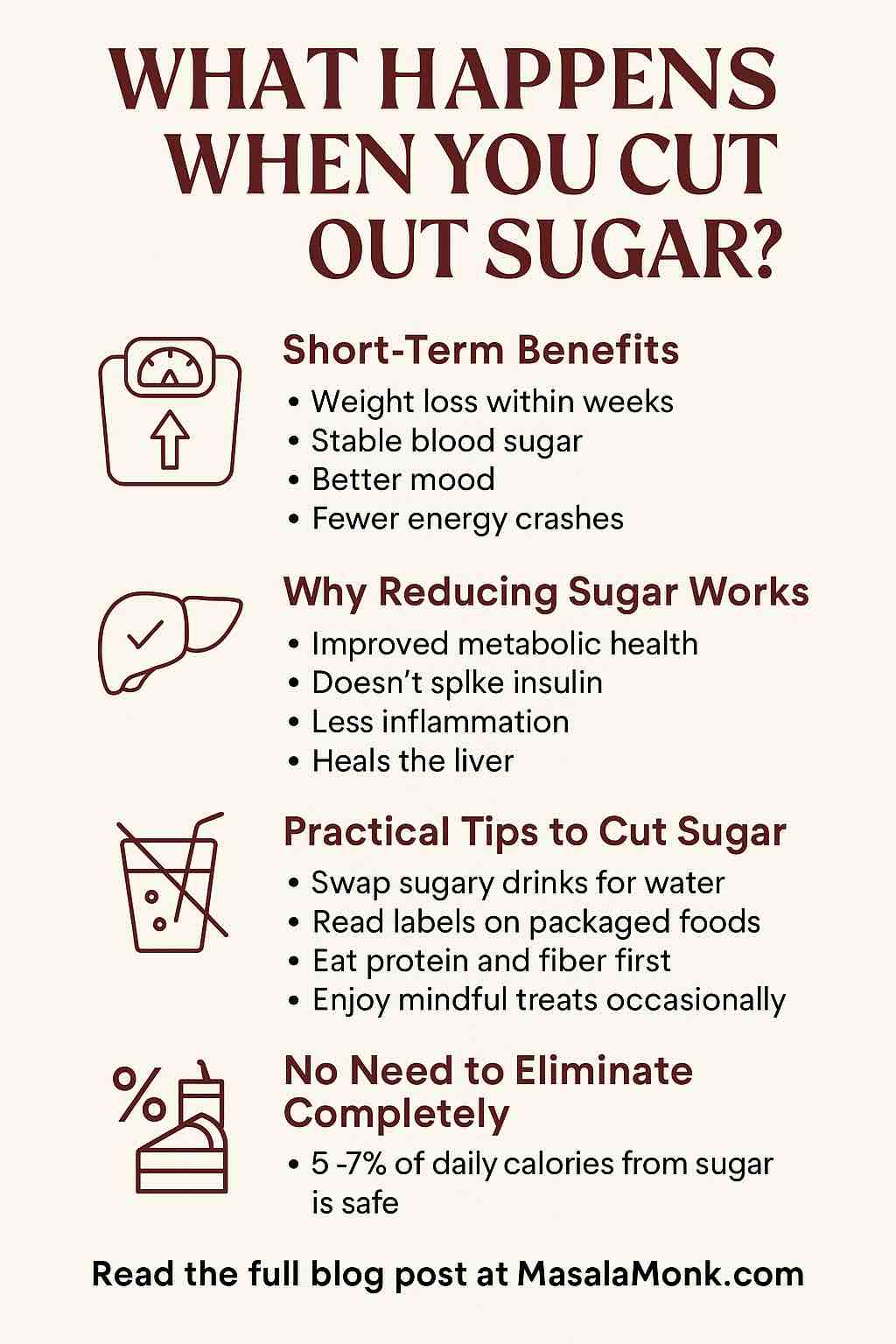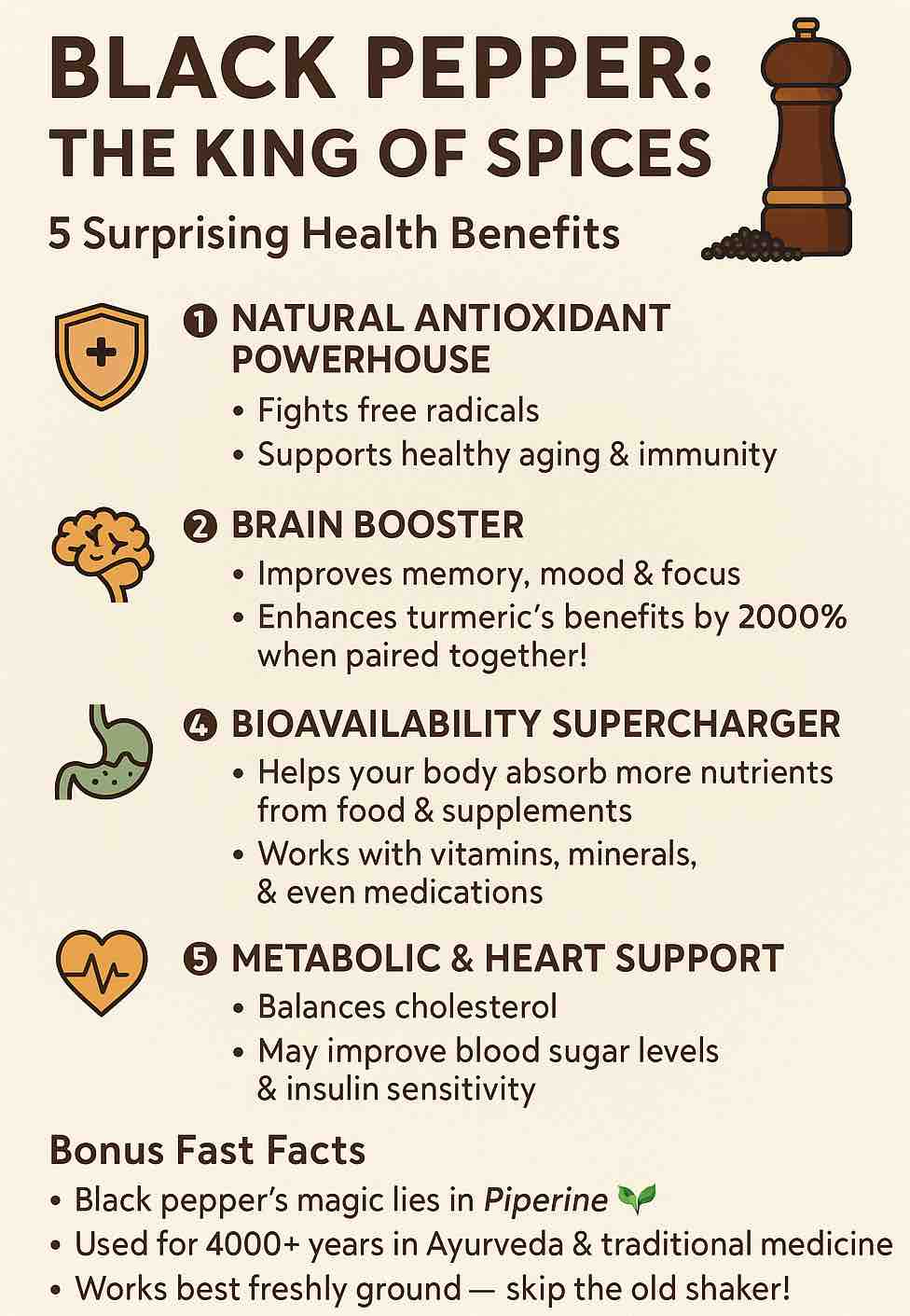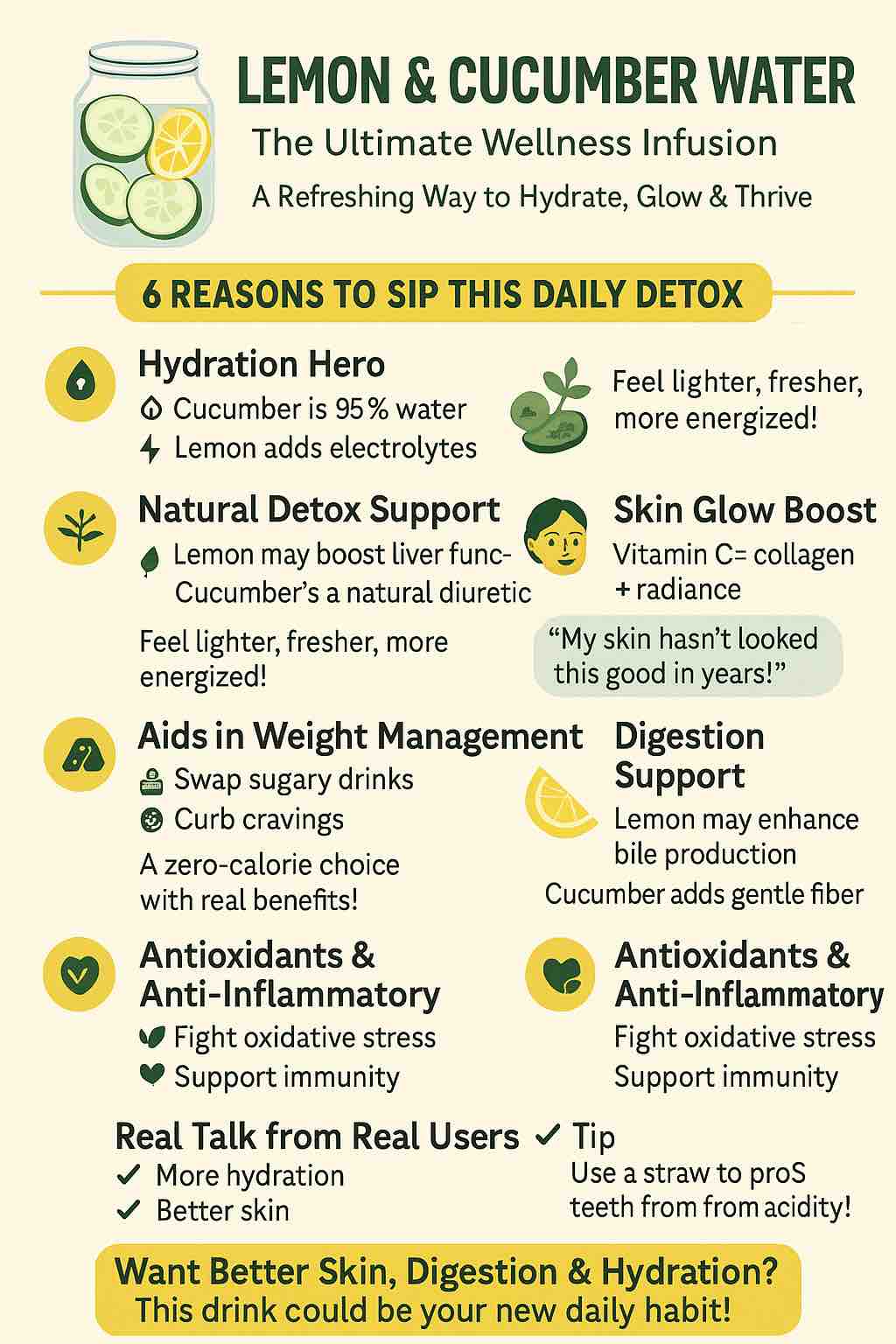
In the age of mindful living and clean eating, it’s no surprise that nature’s original electrolyte drink—coconut water—has captured the world’s attention. From athletes to wellness enthusiasts, everyone seems to be sipping this tropical drink. But is the hype deserved?
In this post, we’ll dive into what makes coconut water unique, its science-backed benefits, real-world applications, and what to watch out for—so you can decide how to make the most of this natural hydrator.
🥥 What Exactly Is Coconut Water?
Coconut water is the clear, slightly sweet liquid inside young, green coconuts (around 6–7 months old). Unlike coconut milk, which is extracted from grated coconut flesh and rich in fat, coconut water is low-calorie and fat-free, but rich in electrolytes and phytonutrients.
As coconuts mature, this water gets absorbed into the meat, so younger coconuts yield the most liquid.
📊 Nutritional Snapshot (Per 240 ml / 8 oz)
| Nutrient | Approx. Amount |
|---|---|
| Calories | 45–60 |
| Carbohydrates | 9g (natural sugars) |
| Protein | <2g |
| Fat | <1g |
| Potassium | ~600 mg (13% RDI) |
| Sodium | ~250 mg (10% RDI) |
| Magnesium | ~60 mg (15% RDI) |
| Calcium | ~55 mg (6% RDI) |
| Antioxidants | Flavonoids, cytokinins, vitamin C |
📌 Note: Composition may vary depending on the coconut’s age, origin, and processing method.
💪 Why Coconut Water Is More Than Just a Trend
1. Hydration with a Natural Edge
Thanks to its electrolyte content—especially potassium and sodium—coconut water supports:
- Rehydration after workouts or heat exposure
- Muscle cramp prevention
- Fluid balance during illness or travel
A 2012 study by the Journal of the International Society of Sports Nutrition found that coconut water rehydrated athletes just as effectively as commercial sports drinks—without the added sugar and coloring.
🧴 Practical Tip: Drink fresh coconut water within 30–60 minutes post-exercise for optimal recovery.
2. Supports Heart Health and Blood Pressure
Potassium plays a central role in regulating blood pressure. Most people consume too much sodium and too little potassium—a combination linked to hypertension. Coconut water delivers a significant potassium boost, helping to:
- Lower blood pressure (modestly)
- Reduce stroke risk
- Support heart muscle function
One animal study even showed coconut water reduced blood pressure better than water or potassium chloride alone. Human studies remain limited, but the potential is promising.
❤️ Best For: People with mild hypertension looking for natural support alongside a balanced diet.
3. Antioxidant & Anti-Inflammatory Action
Coconut water contains natural compounds like cytokinins (e.g., kinetin) and flavonoids (e.g., catechin, kaempferol), which:
- Fight free radicals
- Support cell repair
- May delay skin aging and internal inflammation
A 2025 metabolomics study showed that young coconuts (2 months old) had the highest concentration of these protective compounds.
✨ Beauty Insight: Choose younger coconut water for maximum antioxidant punch—fresh is better than bottled.
4. Helps Prevent Kidney Stones
Thanks to its high water content and potassium, coconut water can increase urine volume and reduce crystal-forming substances like calcium and oxalate.
A 2018 study in Evidence-Based Complementary and Alternative Medicine showed coconut water reduced the number of crystals in urine of rats prone to stones.
💧 Pro Tip: Regularly including coconut water in your diet may offer natural protection—especially when paired with good hydration habits.
5. Friendly for Blood Sugar (In Moderation)
Coconut water has a low glycemic load and is mostly composed of simple sugars and fiber. While not carb-free, unsweetened coconut water has been shown in animal studies to:
- Improve blood glucose levels
- Enhance insulin sensitivity
Recent advice from dietitians (2025, EatingWell) suggests that coconut water, especially unsweetened, is safe and helpful for short-term hydration in people with diabetes.
🍬 Caution: Avoid flavored or sweetened coconut water if managing blood sugar.
⚠️ What to Watch Out For
| ⚠️ Consideration | Details |
|---|---|
| Sugar content | Natural sugars are still sugars—avoid brands with added sweeteners. |
| Sodium inconsistency | Commercial brands often don’t contain enough sodium for athletes. |
| Potassium overload | Not ideal for people with kidney disease or those on potassium-restricted diets. |
| Nutrient loss | Pasteurization and long shelf life can reduce antioxidant and vitamin content. |
🛒 Choosing the Right Coconut Water
✔️ Look For:
- “100% coconut water”
- “No added sugar or preservatives”
- Cold-pressed or HPP (High Pressure Processing)
- Harvested from young green coconuts
❌ Avoid:
- “From concentrate” products
- Flavored or sweetened options
- Shelf-stable versions with a long ingredient list
🧃 When and How to Use Coconut Water
| Situation | How to Use It |
|---|---|
| Post-workout | 1 cup to replenish electrolytes |
| Hot weather or sauna | Sipped cold to cool and hydrate |
| Travel/jet lag | Drink ½ cup on arrival |
| Fasting or detoxing | Light hydration without heavy calories |
| Mild hangovers | Replaces lost fluids and minerals |
🥤 Pro Tip: Blend it into smoothies or freeze into cubes for tropical flavor enhancers.
🧬 What’s New in 2025: Cutting-Edge Findings
- Flavonoid Mapping (China, 2025): Confirmed antioxidant profiles vary by coconut age and variety. Young coconuts (2 months old) = highest antioxidant activity.
- Clinical Endorsements: RDs now recommend coconut water as a go-to option for diabetics and those seeking natural hydration.
- Shelf-Life Innovation: New cold-chain preservation methods aim to retain more nutrients in packaged options.
📝 Final Thoughts: Should You Drink It?
Coconut water is more than a fad—it’s a natural, functional beverage with solid nutritional benefits. It may not be a miracle cure, but when used smartly, it supports hydration, heart health, antioxidant defenses, and more.
✔️ Best For:
- Active individuals
- People in hot/humid climates
- Mildly hypertensive or health-conscious consumers
- Those wanting a soda alternative
❌ Not Ideal For:
- High-intensity athletes needing more sodium
- People with advanced kidney disease
- Those expecting dramatic medical benefits
🌿 Bottom line: Nature packaged this hydration booster perfectly—just be sure you’re choosing wisely, drinking in moderation, and using it for the right reasons.
👋 Your Turn
Do you drink coconut water regularly? Have you noticed a difference in your energy or hydration?
Drop your experiences and favorite brands in the comments below, and share this article with someone who needs a tropical hydration boost.
FAQs
1. Is coconut water better than plain water for hydration?
Answer: Coconut water hydrates well due to its electrolytes like potassium and magnesium. It’s especially beneficial after sweating or mild dehydration, but plain water is still best for everyday hydration unless you’ve lost electrolytes through heat, exercise, or illness.
2. Can I drink coconut water every day?
Answer: Yes, 1 cup (240ml) daily is generally safe for most people. It’s a healthy beverage when unsweetened and consumed in moderation, but overconsumption may lead to excessive potassium intake, especially for those with kidney issues.
3. Is coconut water good for weight loss?
Answer: Coconut water is low in calories and can replace sugary drinks, making it helpful in weight loss strategies. However, it’s not a fat-burning drink—its benefit lies in being a healthier alternative, not a direct weight loss agent.
4. Does coconut water help with hangovers?
Answer: Yes. Its electrolyte and fluid content can ease hangover symptoms by rehydrating the body and replenishing minerals lost through alcohol-induced dehydration.
5. Can people with diabetes drink coconut water?
Answer: Yes, in moderation. Choose unsweetened varieties and limit to small servings (½–1 cup) to avoid blood sugar spikes. It’s generally considered safe and hydrating for people with controlled blood sugar.
6. What’s the difference between coconut water and coconut milk?
Answer: Coconut water is the clear liquid from young coconuts—low in fat and calories. Coconut milk is made from grated mature coconut flesh and is high in fat and calories, used mostly in cooking.
7. Is it safe during pregnancy?
Answer: Yes. Coconut water is safe during pregnancy and may help with hydration, digestion, and mild blood pressure support. However, as with any food or drink, it should be consumed in moderation.
8. Can I drink it before or during a workout?
Answer: Yes. Coconut water is a good pre- or post-workout drink for light to moderate activity. For high-intensity workouts, especially in hot environments, you may need a beverage with more sodium.
9. How do I choose the best coconut water?
Answer: Look for:
- 100% coconut water
- No added sugar or flavors
- Cold-pressed or not from concentrate
Avoid shelf-stable brands with additives or “from concentrate” labeling.
10. Can coconut water spoil?
Answer: Yes. Fresh coconut water spoils quickly and should be refrigerated and consumed within a day or two. Packaged varieties have longer shelf lives but still expire—always check the date and storage instructions.













